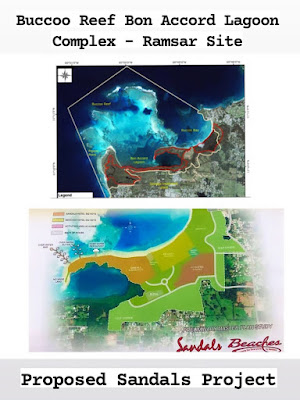The Sandals Scandal - Why did Sandals stop the Tobago Project?
What do we know?
I am sure that we have all heard about the proposal to build a Sandals hotel in South-west Tobago (2018-2019). Like every major construction project, it needs to be approved by the Environmental Management Authority through a rigorous vetting process where all possible environmental effects that the project can be evaluated. The proposed project would consist of 700 to 1000 rooms however, Sandals decided not to continue with the project due to “bad publicity” and “criticism” that surrounded it.
 |
| Figure 1: showing Sandals in Curacao (2021) |
Why was
the project opposed by the public?
The
area in Tobago where the project was proposed (Buccoo Reef Bon Accord Lagoon
Complex) is known as a Ramsar site. A Ramsar site, determined by the Ramsar
convention refers to a “treaty that provides a framework for the conservation and
wise use of wetlands and their resources” according to Ramsar. The Buccoo Reef
Bon Accord Lagoon Complex in South-west Tobago Ramsar site was established in
2006 since it was recognized as a wetland of international importance.
This area has the largest population of seagrass in Trinidad and Tobago (approximately 50 hectares) and a large complex mangrove system spanning 130 hectares which are essential to marine life there acting as a feeding ground and a nursery. At this Ramsar site alone, there are more than 240 species of plants and animals that depend on this wetland.
 |
| Figure 2: showing the Ramsar Site and the area for the Proposed Hotel (Nirvana Rajaram 2020) |
This is why
the public was unhappy with the Sandals proposal. They knew the importance of the
Buccoo Reef Bon Accord Lagoon Complex to the environment and to their
livelihoods. The introduction of this hotel could have had catastrophic effects
on this delicate ecosystem that we so desperately need to preserve. The organization
was given alternative locations to possibly construct the hotel where
there would be lesser impacts on the environment but they declined the offers.
What does
this say about the citizens of Trinidad and Tobago?
In my
opinion, I think that our citizens care immensely about our environment. It may
not always seem that way because as Trinbagonians we live a joyous, carefree
lifestyle but we do care about our future generations. We used the opportunity
provided by the Environmental Management Authority through public outreach forums
to voice our concerns about the hotel’s impacts. I think, in the near future,
we can have an environmentally conscious Trinidad and Tobago.

Figure 3: showing environmental consciousness (shutterstock 2021)



Comments
Post a Comment